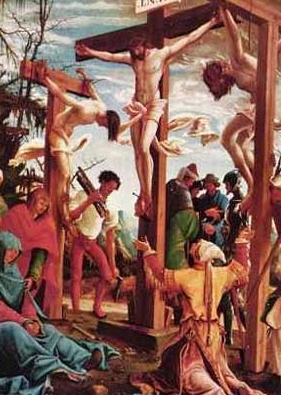|
|||
|
Philatelia.Net / Pirates. Bandits. Adventurers / Plots / The directory «Plots»Dismas and GestasSaint Dismas (sometimes spelled Dysmas or only Dimas, or even Dumas), also known as the Good Thief or the Penitent Thief, is the apocryphal name given to one of the two thieves, who was crucified alongside Jesus. Dismas was the thief who repented of his sins and asked Jesus to remember him in his kingdom. The two thieves were crucified at the same time as Jesus, one on his right hand, and one on his left. According to the Gospel of Luke 23:39-43: [O]ne of the malefactors which were hanged railed on him, saying, "If thou be Christ, save thyself and us." ♦ But the other answering rebuked him, saying, "Dost not thou fear God, seeing thou art in the same condemnation? ♦ And we indeed justly; for we receive the due reward of our deeds: but this man hath done nothing amiss." ♦ And he said unto Jesus, "Lord, remember me when thou comest into thy kingdom." ♦ And Jesus said unto him, "Verily I say unto thee, today shalt thou be with me in paradise." According to Matthew, both of the thieves at first mocked Jesus; Luke however, mentions only that one of the thieves mocked him. According to tradition, the Good Thief was crucified to Jesus' right hand, and the other thief was crucified to his left. For this reason, depictions of the crucifixion often show Jesus' head inclined to his right, showing his acceptance of the Good Thief. In the Russian Orthodox Church, both crucifixes and crosses are usually made with three bars: the top one, representing the titulus (the inscription that Pontius Pilate wrote and was nailed above Jesus' head; the longer crossbar on which Jesus' hands were nailed; and a slanted bar at the bottom representing the footrest to which Jesus' feet were nailed. The footrest is slanted, pointing up towards the Good Thief, and pointing down towards the other. The name of "Dismas" for this person, unnamed in the canonical Gospel itself, appears first in the twelfth century in the Gospel of Nicodemus. The name of "Dismas" was adapted from a Greek word meaning "sunset" or "death." The other thief's name is given as Gestas. The apocryphal Arabic Infancy Gospel calls the two thieves Titus and Dumachus, and adds a tale about how Titus (Dismas) prevented the other thieves in his company from robbing Mary and Joseph during their Flight into Egypt. In Russian tradition Good Thief's name is Rakh. In the Eastern Orthodox Church, one of the most moving hymns of Good Friday is entitled, The Good Thief, and speaks of how Christ granted Dismas Paradise. There are several moving compositions of this hymn which are used in the Russian Orthodox Church and form one of the highlights of the Matins service on Good Friday. In medieval art, St Dismas is often depicted as accompanying Jesus in the Harrowing of Hell as related in 1 Peter 3:19–20 and the Apostles' Creed (though neither text mentions the thief). Gestas, also spelled Gesmas, is the apocryphal name (first appearing in the Gospel of Nicodemus) given to one of the two thieves who was crucified alongside Jesus. According to legend, Gestas taunted Jesus about not saving himself, while Dismas asked for mercy. Dismas was saved, and Gestas was not. The apocryphal Arabic Infancy Gospel refers to Gestas and Dismas as Dumachus and Titus, respectively. Ajman, 1973, Crucifiction Andorra (french post), 1968, The Death of the Christ Cooê Islands, 1977, Christ on the Cross Gambia, 1989, Christ on the Cross Gambia, 1992, Christ on the Cross Gambia, 1992, The road to Calvary (Tintoretto) Guinea, 2010, Christ on the Cross Mali, 1974, The Crucifiction Manama, 1972, Crucifiction (Veronese) Monaco, 1972, The Crucifixion Nicaragua, 1968, The Crucifiction Panama, 1967, The Crucifixion St. Lucia, 1971, Christ on the Cross St. Lucia, 1971, Christ on the Cross Togo, 1984, Christ on cross Turks & Caicos, 1972, The Three Crosses (Rembrandt) Umm al Quiwain, 1972, Scenes from the Passion of Christ (detail) Advertising: |
|||
© 2003-2025 Dmitry Karasyuk. Idea, preparation, drawing up
|

